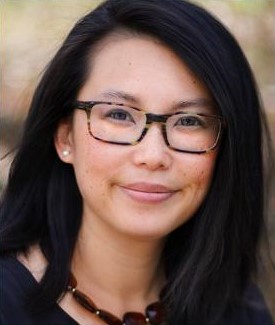Peace that passes understanding: not one of us
By Rev. Mihee Kim-Kort
Mark 9:38–50
John said to him, “Teacher, we saw someone casting out demons in your name,
and we tried to stop him, because he was not following us.”
Reflection: I love when people ask me about my kids. People ask, “How old are they now?” and “How are they getting along?” and invariably, “How are you still standing?” It’s a way to connect over something ordinary, human. It’s a way to feel that I am one of you.
In Mark, John has the opposite in mind. He says, this man was not following us. He’s not like us. He’s not one of us.
In an ABC “20/20” special, journalists showed children pictures of men of different races and then recorded their reactions. When shown a photo of a black man and a white man, the children interpreted the black man as mean and criminal and the white man as nice and likely to be a teacher. The photo of the white man was of Oklahoma City bomber Timothy McVeigh; the black man pictured was Harvard University professor Roland Fryer.
It starts early—all the biases, assumptions, judgments—it’s in the air we breathe. “They’re not part of us. They’re not one of us. They’re not us.”
The gospel of Jesus, however, leads to a very different conclusion: not only is every person one of us, each is the living representation of Christ. Instead of saying, “Teacher, we saw someone,” John should have said, “Teacher, we saw you.” John should have seen Jesus in this stranger. And what about us? In the foreigner, the outsider, the minority, do we see God or just “someone”?
Action: I keep hearing that protest chant—after the anniversary of Michael Brown’s killing—“This is what theology looks like.” I see them standing huddled together, heads down, laying hands on each other like it’s an ordination, as they shout #blacklivesmatter and #nojusticenopeace, anointed with sweat, tears, blood, and Spirit. I see them set apart for a holy work in which liturgy is wailing and protest. What should theology look like today?
Prayer: O wonderful Christ, who became an outsider to save us, help us see you in every “someone” we encounter. And in loving them, help us become more like you. Amen.
 Rev. Mihee Kim-Kort is a Presbyterian minister, agitator, speaker, writer, and slinger of hopeful stories about faith and church. Her writing and commentary can be found at TIME., BBC World Service, USA Today, Huffington Post, Christian Century, On Being, Sojourners, and Faith and Leadership. She is a religious studies PhD student at Indiana University.
Rev. Mihee Kim-Kort is a Presbyterian minister, agitator, speaker, writer, and slinger of hopeful stories about faith and church. Her writing and commentary can be found at TIME., BBC World Service, USA Today, Huffington Post, Christian Century, On Being, Sojourners, and Faith and Leadership. She is a religious studies PhD student at Indiana University.
This year’s A Season of Peace resources are designed to help Presbyterians explore different forms and lenses for peacemaking. From the personal level to global issues like human trafficking and sustainable development, these reflections and prayers will help grow the faith and witness of the whole church. Through the days of this year’s A Season of Peace, we are invited to reflect on:
- Peace that passes understanding: personal testimonies of faith and peace within self, within families, within communities
- Partners in peace: interfaith work for peace and justice, building peace between us while witnessing to peace in our wider world
- Go and see: reflections from travel study seminar participants
- The church and its witness: reflections on addressing trafficking in its varied forms
- Peacemaking and practice: stories and reflections on building bridges and crossing divide
Each author represents a variety of vocations and experiences in peacemaking efforts. Individuals and households are invited to make use of these daily reflections beginning on Sunday, September 2, and concluding on World Communion Sunday, October 7.

